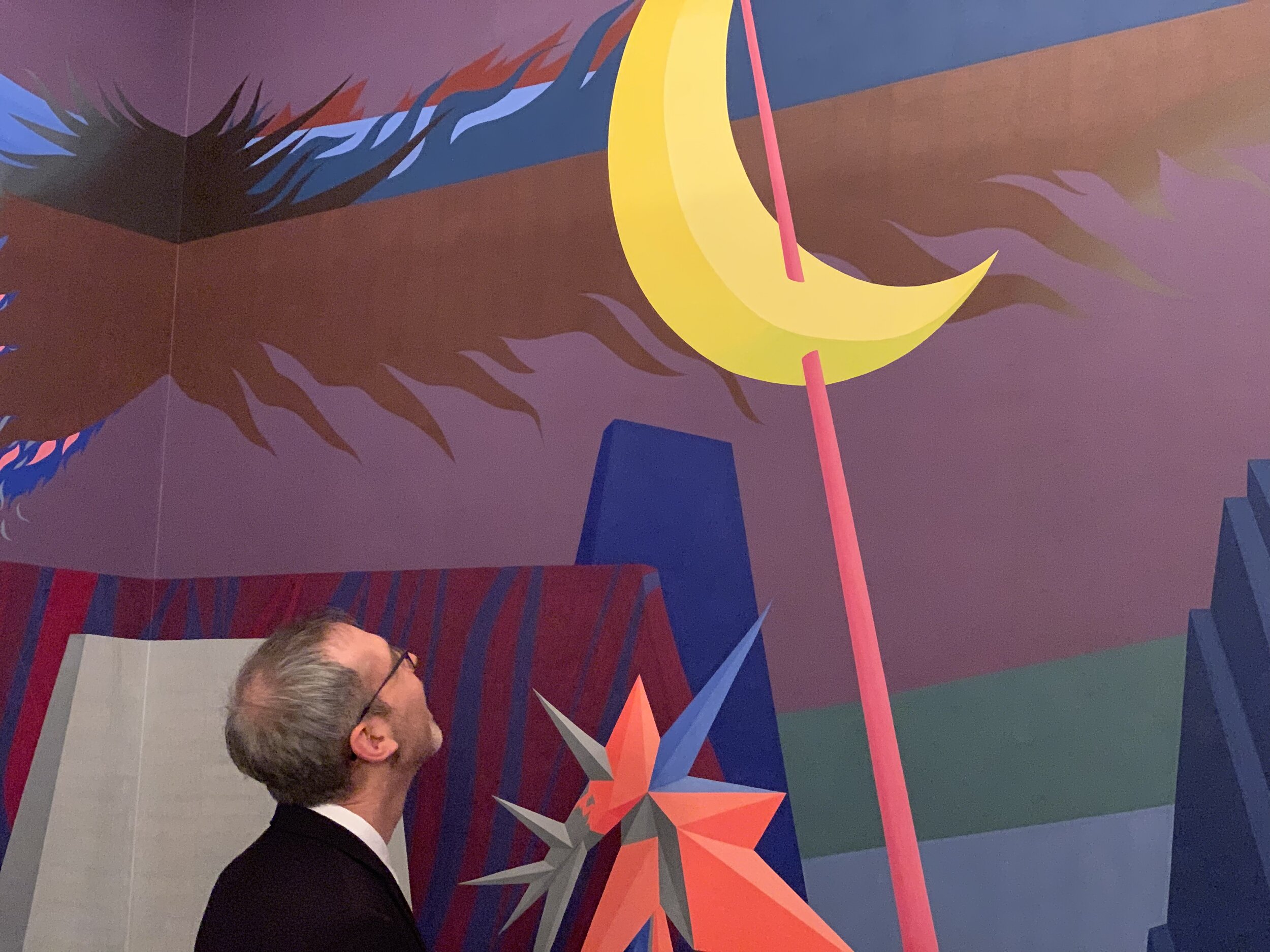I recently gave a lecture at the American Italian Cultural Center in NOLA, the topic exploring the spiritual dimensions of three major Italian films. For all of you astro buffs out there, there was a massive amount of transiting 9th house activity in my astrology chart, the area concerning travel, both literally and figuratively, and higher knowledge and learning. I was struck by the complex and paradoxical nature of the directors’ spiritual and faith orientations; for example, Federico Fellini was a lifelong Catholic yet consulted the I-Ching, an ancient Chinese system of divination, and also recorded his dreams dogmatically. He, under strict supervision, took LSD to gain insight into different realms, yet learned through some of his dreams that though he often played the part of a rebellious child, he appreciated the check of the church on his creative machinations.
What ultimately interested me, though, was Fellini’s admonition that one shouldn’t always consult such tools as I-Ching or astrology, and if one did, he ran the risk of being paralyzed by an idle, overactive mentality. Interesting, in astrology, the 12th house, arguably the most spiritual of all, symbolizes isolation but also spiritual freedom from the material world; so, perhaps confinement isn’t always so bad. Yet Fellini had an inarguable point, namely the intent, and perhaps even the spirit of consulting a higher, mysterious power has as much to do with the act of divination itself, whatever the method.
Which brings me to the greatest of all the questions: is our existence governed by fate or free will? This question has animated virtually all cultures over all time. It seems the more ancient you go, the more a culture believes in fate. But with the rise of Western civilization, science, and modern religion, and the subsequent discovery and reinterpretation of the laws of nature (notice I did not say mastery of nature), many of us lead incalculably more comfortable lives than those even one hundred years ago. But the questions still remains, what is fate, and what is free will?
The author of the famous Moment of Astrology believes that astrology as the Queen of all systems of divination allows us to negotiate with the heavens. We might not ultimately decide our fates, but we do get to negotiate. I take this a step further and submit that the reason (pun accidentally occurring) we get to negotiate is because we accept chance and fate in the form of things like astrology. One is born at a specific time and place, the heavens transfixed in a moment, the seed that ultimately flowers into one’s existence. Yet coming to an astrology session means a momentary suspension of one’s supposed free will agency and that by consulting and asking a different, oblique, and arguably higher power for guidance, one gains free will agency. I’ve been holding as of late that it is no “I” as an astrologer who performs astrology, but I is “I” who learns and studies astrology and in the moment of an Inner Makeup session, performs a reading. This is akin to a musician who learns his craft through practice and then performs a piece of music or an actor who studies his lines and then recites them in a play. This is certainly not the egoistic “I” of free will.
Yet again, by suspending one’s self, the self actually becomes empowered in a circuitous turn of events, akin to a suspension of disbelief during the witnessing of a performance or work of art, a momentary slip of the inquiring mind, and the gaining of insights that come from within, or somewhere else, that lead to a transformation of the self.
Might Fellini have been onto something? That how we approach such matters is just as critical as the matter itself? As the poet Rilke famously asked of us, Be patient toward all that is unsolved in your heart and try to love the questions themselves, like locked rooms and like books that are now written in a very foreign tongue. Do not now seek the answers, which cannot be given you because you would not be able to live them. And the point is, to live everything. Live the questions now. Perhaps you will then gradually, without noticing it, live along some distant day into the answer.
This theme led me to recall an old episode of the Twilight Zone, Nick of Time, now available on Netflix where a young, newly-wed couple becomes stranded in a small Ohio town and discovers a “Mystic Seer” machine/napkin holder in a local diner. We are introduced to the wife who brandishes a confident, striding attitude whereas the husband (a young William Shatner) fashions a much more brooding, anxiety-laden attitude towards everyday affairs. The husband is up for a promotion at work, and after consulting the Mystic Seer, who spits out a slip “it has been decided in your favor,” he hurriedly rushes to a pay phone to call his employer. He learns through the grapevine that he has received the promotion, fulfilling the prophecy of the oracle. The husband consults the oracle obsessively over a variety of matters with varying degrees of ambiguity and accuracy, but nevertheless the couple comes to believe in the oracle, that is until they decide it is better not to consult it rather than consult it and to follow the wife’s initial buoyant “take life as it is” attitude vs. the fatalistic, fearful attitude of the husband. The episode closes with another couple who apparently consults the Mystic Seer machine habitually and are portrayed as addicted and entrapted, in astrological terms by twelfth house matters.
Which brings me back to Fellini’s charge that one shouldn’t consult methods of divination too much and that intent has a lot to do with the outcome especially where self-fulfilling prophesies are concerned. But this still leaves open the question of fate vs. free will. We like to think, think being the operative word, that we have free will. But the material sciences, and/or spirituality, have taught us that within and outside of ourselves there is much more going on beneath the surface. Regardless, does the mind, especially our conscious perceiving mind, have the ability to govern fate? I believe yes, but the percentage is small. Also, as Carl Jung noted, when the conscious ego becomes inflated, when we try to become gods controlling fate, we are invariably slapped back down by nature via tragedy. Yet this does not imply an entirely deterministic existence.
If we have the ability to freeze phenomena, like an individual’s birth as symbolized through a natal chart, through the art of astrology, at least for a moment, we are gifted a glimpse into something beyond space and time because a birth chart, and any astrology chart, is a snapshot in time—but it doesn’t stop time. It is a chance to reflect and glean new insights garnered from a process largely governed by chance. This is where I’ve struggled a bit. Is chance deterministic? Is there a set order of numbers, directions of particles, and movement of light that is destiny? Yes and no, because we know that when we look at something, the observer effect, we change it. However, that does not mean we receive a blank check for free will, and regardless of our perspective, massive forces forever flow beyond our control.
So again, it goes back to Fellini, who started as a gag writer and artist, and in his words, ended up a philosopher. In astrological terms, this progression would look something like Gemini to Sagittarius, curiosity to knowledge. The only question is, what are your questions? And will you love them enough to believe in them and hopefully receive divine revelation? Or, will you fearfully seek the answers that may never come?















